Simple and Clean Machine

This module explores the six different types of simple machines in order to design and build a compound machine that can help reduce surface contact. This may decrease viral transmission from person to person. Our student engineers will be challenged to create a Rube Goldberg machine composed of multiple simple machines. The goal of the Simple and Clean Machine is to minimize contact with surfaces in order to help prevent the spread of viral diseases such as COVID-19.
After this module you will be able to:
- Explore the use of simple machines in everyday life by investigating how different simple machines work and the role they play in engineering.
- Apply the engineering design process by creating a functioning Rube Goldberg Simple and Clean Machine designed to perform a task that reduces contact with commonly used surfaces such as light switches and doorknobs.
- Explain how the Simple and Clean Machine helps reduce surface-to-surface contact and minimize risk of viral transmission.
SCIENCE TEKS
- 6.3(C) Identify advantages and limitations of models such as size, scale, properties, and materials.
- 9B.4(C) Compare the structures of viruses to cells, describe viral reproduction, and describe the role of viruses in causing diseases such as human immunodeficiency virus (HIV) and influenza.
- 6.8.E Investigate how inclined planes can be used to change the amount of force to move an object.
MATH TEKS
- 7.6(C) Make predictions and determine solutions using experimental data for simple and compound events.
NGSS Science & Engineering
- Modeling 6-8: Use and/or develop a model of simple systems with uncertain and less predictable factors.
- Modeling 9-12: Design a test of a model to ascertain its reliability.
- Constructing Explanations and Designing Solutions 6-8: Optimize performance of a design by prioritizing criteria, making tradeoffs, testing, revising, and retesting.
Materials
Your Simple and Clean Machine can be built using common household materials including but not limited to the list presented below which provides some ideas for materials that can be used.
- Cardboard
- Adhesive materials (ex., tape, glue, marshmallows)
- Scissors
- Paper
- String/ribbon
- Incline planes (ex., books, cards, DVD box sets)
- Levers (ex., ruler, dominoes, pencils)
- Wedges (ex., door stop, deck of cards, block)
Safety
Please seek adult supervision if any power tools are used during the build process. Use caution during any parts of the process that require cutting of materials or use of any sharp objects.
Activity
Watch the video below.
Dig Deeper
Read More
What are Simple Machines?
Did you know there are 6 different simple machines: a lever, pulley, screw, wedge, inclined plane, and wheel and axle? Download PowerPoint Presentation
What is a Virus?
Did you know a virus can hijack a cell and destroy it? This Khan Academy article gives a brief description of what a virus is and how it attacks a cell. It addresses how a virus can be treated and the differences between viruses and bacteria.
CDC Guidelines on How to Take Precautions from Getting Sick: (Mentioned in video)
Did you know that a person who has COVID-19 can transmit it to 2.5 other people? The CDC has put in place guidelines to help reduce the spread of it.
Engineers of Color
Did you know that black engineers have revolutionized the transportation, beauty, and the aerospace industries? They have made incredible contributions to many other industries as well. This online museum highlights some of the innovations produced by Black engineers and STEM professionals that revolutionized how we do things today.
Watch This
- Simple Machines in Everyday Life
- A Breakdown of the Engineering Design Process
- Lytic and Lysogenic Cycle (Mentioned in Video)
- Let’s Not Wait for Black History Month to Celebrate Contributions from Black Engineers That Move Humanity Forward
Show What You Know
Meet Our Expert
Dr. Jerrod Henderson is an Instructional Assistant Professor in the Cullen College of Engineering at the University of Houston. He joined the University of Houston after six years as a chemical engineering faculty member at the University of Illinois. He has dedicated his career to increasing the number of students who are in the pipeline to pursue STEM careers. He believes that exposing students to STEM early will have a lasting impact upon their lives and academic pursuits.
Meet The Teachers
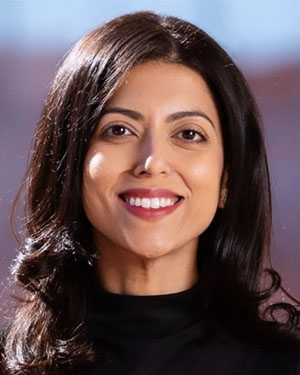
Dr. Mariam Manuel
Executive Director, teachHOUSTON STEM Interactive
Clinical Assistant Professor, teachHOUSTON, Department of Mathematics, University of Houston
Dr. Mariam Manuel is a proud graduate of the University of Houston and was part of the inaugural class of the teachHOUSTON Program during its inception in 2007. She earned her Ph.D. in STEM Education through Texas Tech University, and her research interests include STEM teacher education, engineering design education, and culturally responsive pedagogy. Dr. Manuel also teaches a course that connects middle school physics content with inquiry-driven instructional strategies and teaches graduate level coursework in Engineering Design Education, for the UH STEM Master’s program.
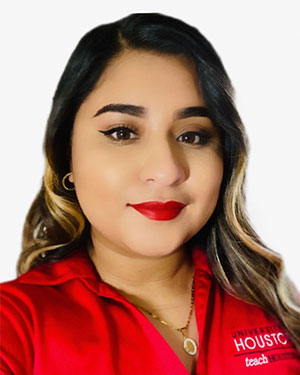
Wendy Argueta
Biology Teacher, Lamar High School, Houston Independent School District
University of Houston, College of Natural Sciences and Mathematics, teachHOUSTON Alumna
Wendy is a certified Biology teacher at Lamar High School. She earned a Bachelor of Science in Biology from the University of Houston and is a proud teachHOUSTON alumna. She is a recipient of the Noyce Scholarship and presents at national conferences. She is passionate about bringing equity to her classroom and building long-lasting relationships with her students. Her lessons incorporate culturally responsive pedagogy as well as the Engineering Design Process. She is the sponsor of a women’s empowering club, Girls at Lamar, whose goal is to uplift women and expose young girls to professional women in the STEM field.
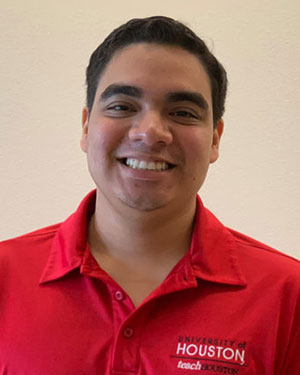
Benito Toscano
Mathematics Major, teachHOUSTON Student Teacher, University of Houston, College of Natural Sciences and Mathematics
Benito is an undergraduate student at the University of Houston. He is majoring in mathematics, while obtaining his teaching certification through the teachHOUSTON Program. He is a Noyce Scholar and has attended various conferences to learn more about how to improve his teaching pedagogy. He will student teach next semester and will be a full-fledged teacher starting in the spring semester of 2021.
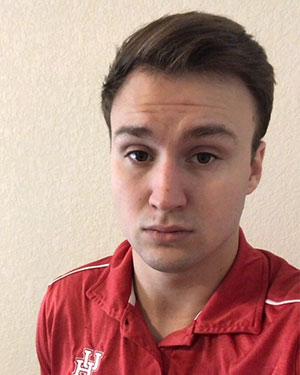
Dalton Kozak
Mathematics Major, Computer Science Minor, teachHOUSTON Preservice Teacher, University of Houston, College of Natural Sciences and Mathematics
Dalton is an undergraduate student at the University of Houston. He is majoring in Mathematics and minoring in Physics while obtaining his teaching certification through the teachHOUSTON Program. Dalton is on the Dean’s Distinguished Scholars List. He also does research in the mathematics department on Linear Algebra/Matrix Theory Development in Big Data and Machine Learning. He wants to go to graduate school for Theoretical Mathematics and get a Ph.D. in order to be a professor at a university. He has a particular interest in Number Theory and Complex Analysis.
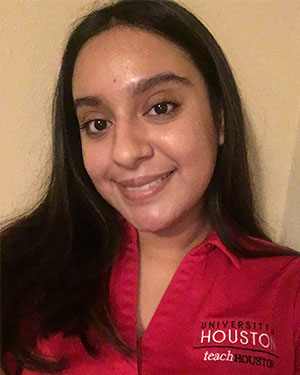
Lizbeth Galindo
Mathematics Major, teachHOUSTON Preservice Teacher, University of Houston, College of Natural Sciences and Mathematics
Lizbeth is an undergraduate at the University of Houston. She is majoring in Mathematics and obtaining teacher certification through the teachHOUSTON Program. She wants to attend graduate school and get a Ph.D. in education, in hopes of becoming an administrator in the future.
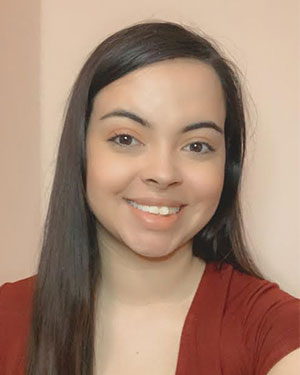
Leslie Trevino
Chemical Engineering Major, Computer Science Minor, teachHOUSTON Preservice Teacher, University of Houston, College of Natural Sciences and Mathematics
Leslie is an undergraduate student at the University of Houston. She is majoring in Chemical Engineering with a minor in Computer Science, while obtaining teaching certification through the teachHOUSTON Program.
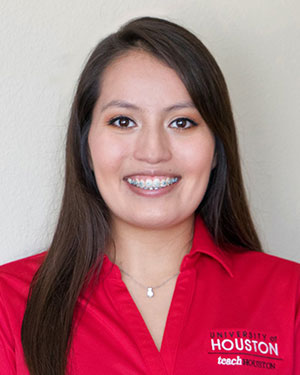
Brenda Chavez
Mathematics Major, teachHOUSTON Preservice Teacher, University of Houston, College of Natural Sciences and Mathematics
Brenda is an undergraduate student at the University of Houston. She is pursuing a degree in Mathematics while also obtaining her teaching certification through the teachHOUSTON Program.
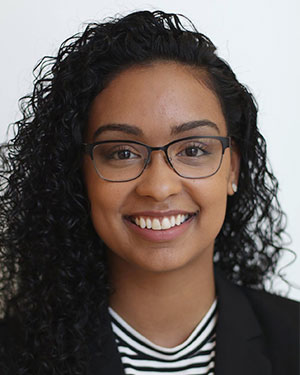
Liandra Larsen
teachHOUSTON STEM Interactive Video Editor
Liandra is a Research Graduate Assistant for the teachHOUSTON Program. Currently, she’s pursuing her Ph.D. in Higher Education Leadership and Policy Studies at the University of Houston. Her research interests include improving the university experience for first-generation and transfer students. In her spare time, she enjoys dancing, binge-watching shows on Netflix, and overspending at Target.
- https://www.teachengineering.org/lessons/view/cub_simp_machines_lesson05
- https://flexbooks.ck12.org/cbook/ck-12-middle-school-physical-science-flexbook-2.0/section/13.13/primary/lesson/compound-machine-ms-ps
- https://quizizz.com/admin/quiz/56fbd2f63379ef070a721263/simple-machines-test
- https://www.teachengineering.org/lessons/view/cub_simple_lesson01
- https://media.rubegoldberg.com/site/wp-content/uploads/2017/10/Rube-Goldberg-Lesson-Plans.pdf
- https://tinkerlab.com/engineering-kids-rube-goldberg-machine/
- https://www.teachengineering.org/content/wpi_/activities/wpi_assistive_device/wpi_assistive_device_activity1_prepost-test_v2_tedl.pdf
Dig Deeper Sources
- https://www.teachengineering.org/content/cub_/lessons/cub_simple/cub_simple_lesson01_presentation_v1_sas.pptx
- https://www.khanacademy.org/science/biology/biology-of-viruses/virus-biology/a/bacteriophages
- https://www.cdc.gov/coronavirus/2019-ncov/prevent-getting-sick/index.html
- http://blackinventor.com/
- https://youtu.be/_fOA4nCWYms
- https://youtu.be/b0ISWaNoz-c
- https://www.youtube.com/watch?v=8FqlTslU22s
- https://www.youtube.com/watch?v=NeKPmPSopn4